Belarusian journalists in Paris: Meetings, exchange, and a solidarity action
At the end of October, a delegation of Belarusian journalists visited Paris. As part of the working trip, they met with editorial teams of leading French media outlets and took part in solidarity actions in support of imprisoned journalists currently behind bars in Belarus.
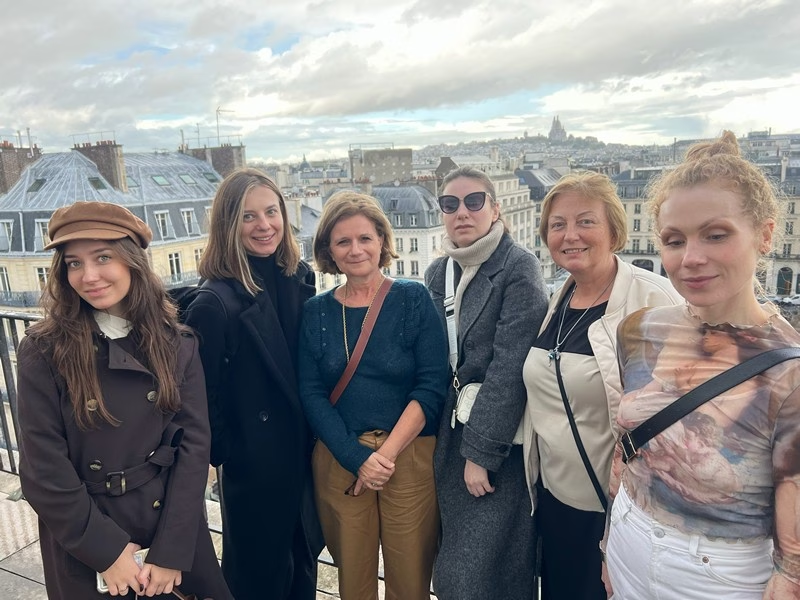
Belarusian journalists with a colleague from Agence France-Presse. October 2025. Photo: BAJ
Networking — a chance for Belarusian media to be visible to the world
An important part of the visit was getting acquainted with the experience of leading French media — from global news agencies to national radio stations and newspapers that set journalistic standards and shape the international agenda.
The first stop was Agence France-Presse (AFP) — one of the world’s oldest and largest news agencies, publishing over 2,000 news items daily in multiple languages and employing hundreds of correspondents across dozens of countries. Belarusian journalists saw firsthand how AFP’s 24/7 newsroom operates, how fact-checking is organized, and how international desks maintain both objectivity and speed in covering events.
Equally significant was the meeting with Reporters Without Borders (RSF) — an organization that has defended press freedom and journalists around the world for more than 35 years. RSF is known for its annual ranking of countries with the worst press freedom records. The conversation focused on the risks of working in exile, personal pressure on journalists and their families, the need for anonymity, and the psychological challenges of the profession.
French colleagues shared practical insights on providing legal and financial support to media in exile — a topic especially relevant to Belarusian outlets that now survive almost entirely thanks to donor programs and international solidarity.
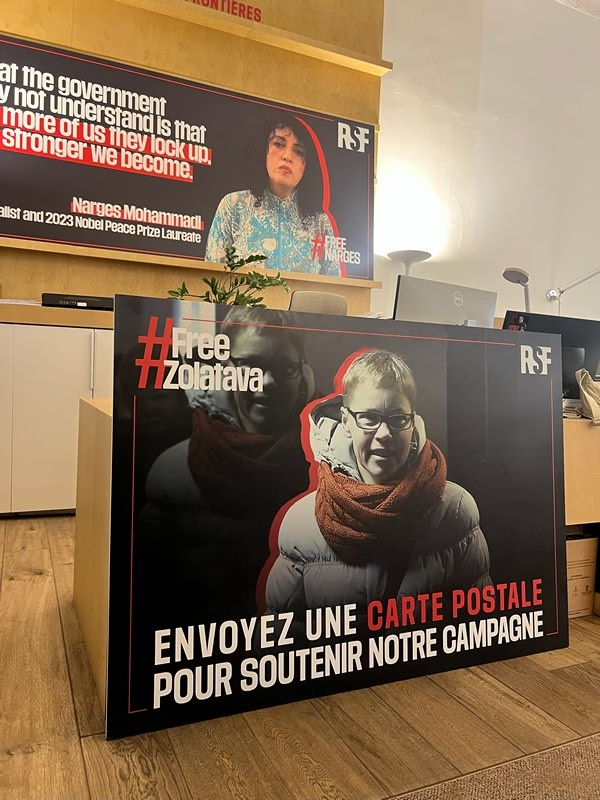
A solidarity stand at the Reporters Without Borders (RSF) office. October 2025. Photo: BAJ
Inside French public broadcasting and radio journalism
Special attention was given to Radio France Internationale (RFI) — an international broadcaster reaching audiences in more than 150 countries in dozens of languages. Discussions there focused on how to maintain quality in multilingual broadcasting, adapt news to diverse cultural contexts, and communicate with audiences living under propaganda pressure.
At Radio France — the country’s main public broadcasting group — the Belarusian journalists learned about its model of multimedia operations and interregional coordination. It’s not only a radio network but also a broad ecosystem of cultural and informational projects where traditional and digital formats coexist.
The discussions explored the role of public broadcasting in democratic countries and how transparency of funding and audience trust uphold the high standards of journalism.
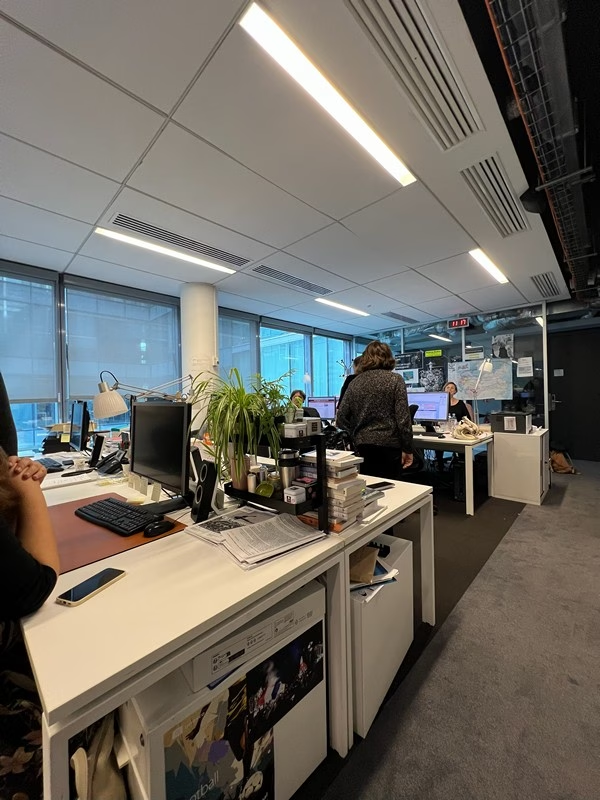
Radio France Internationale newsroom. October 2025. Photo: BAJ
Learning from Le Monde’s digital transformation
The visit concluded with a meeting at Le Monde, one of Europe’s most influential newspapers, which has been a symbol of analytical and independent journalism for nearly 80 years. The editors shared their experience of transitioning from a traditional print model to a digital-first newsroom. They explained how they not only retained but expanded their readership through in-depth analysis, investigative journalism, and innovative visual storytelling.
The meetings allowed Belarusian journalists to immerse themselves in their French colleagues’ professional experience and see how similar challenges — editorial independence, accountability to the audience, financial sustainability, and journalist safety — are addressed in different countries.
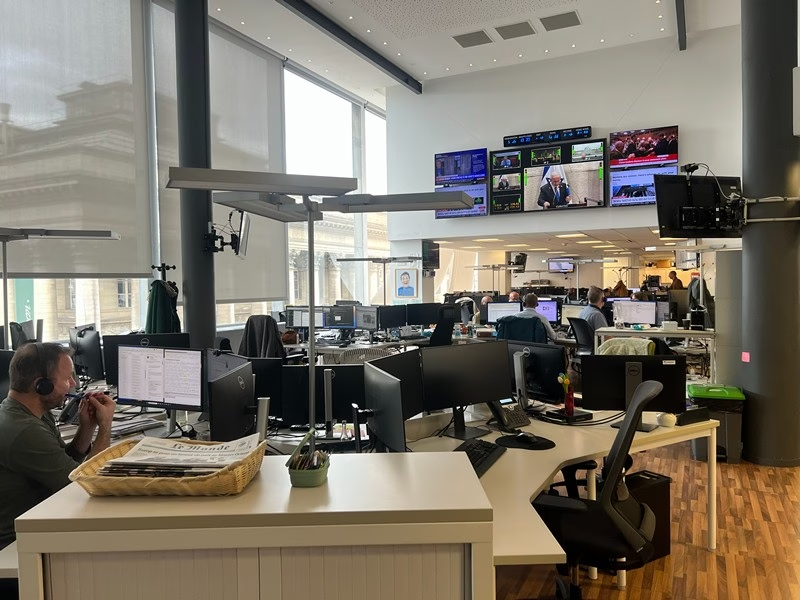
Agence France-Presse newsroom. October 2025. Photo: BAJ
Cybersecurity, digital anonymity, and moral support
The discussions with French media and organizations went far beyond newsroom practices. They addressed the very survival of journalism in exile — and the human dimension of the profession, when work becomes not just self-expression but an act of civic courage.
Journalists shared how they have built new editorial teams abroad, often without permanent offices and under various legal statuses. They discussed coordination across teams scattered across cities and even continents, maintaining editorial standards with limited resources, and upholding professional ethics while colleagues are imprisoned or under threat of persecution.
French partners were particularly interested in how the Belarusian media community manages to maintain visibility and audience trust despite being cut off from the domestic information space.
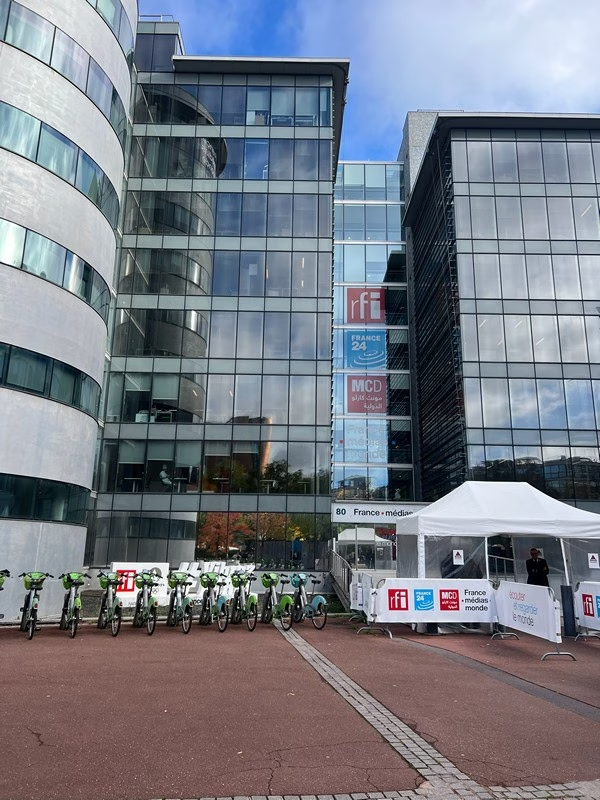
Paris, October 2025. Photo: BAJ
Another topic was the psychological and physical pressure faced by Belarusian journalists and their families. Many must work anonymously, concealing their editorial affiliations. French journalists shared their approaches to cybersecurity, digital anonymization, data protection, and moral support for staff — a theme especially close to the Belarusians, who continue to face government persecution even in exile.
Most independent Belarusian outlets have been labeled “extremist formations” by the authorities. This means even readers can be punished for subscribing or commenting. In such conditions, economic independence is impossible, and most outlets survive thanks to international grants and aid programs. The meetings included honest discussions on balancing donor dependence with editorial autonomy, and building long-term financial sustainability in exile.
Belarusian journalists also had the opportunity to observe how French newsrooms work with sources, conduct fact-checking, build international partnerships, and organize structures for global audiences. A key topic was journalism’s democratic role — and its ability to resist propaganda, an issue equally relevant in both France and Belarus.

At the Reporters Without Borders (RSF) office. October 2025. Photo: BAJ
A joint action for imprisoned journalists
The visit culminated in a joint action by the Belarusian delegation and French colleagues in support of imprisoned journalists in Belarus. It was not only an act of solidarity but also a symbol of the profession’s unity across borders. French journalists emphasized that freedom of speech is a shared value — and that defending Belarusian journalists is part of Europe’s collective responsibility.
Journalists’ comments
“The goal of our visit was to learn how major international media operate and bring that experience into the Belarusian context,” said Maryia Prokharchyk, editor-in-chief of This Minsk Media. “For us, it’s not just professional curiosity, but a chance to understand how to build a sustainable newsroom when nearly everything must start from scratch.
Journalism in Belarus is now virtually banned, so we’re searching for new models — how to remain professional and independent while keeping our teams, audiences, and belief in the purpose of our work.”
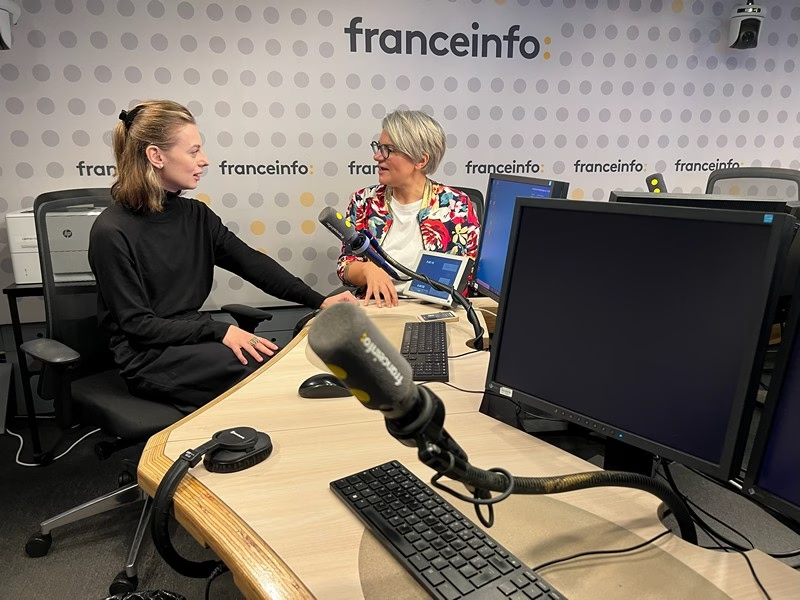
Editor-in-chief of This Minsk Media Maryia Prokharchyk giving an interview to Radio France. October 2025. Photo: BAJ
“I wanted not only to see how French media operate but also to learn what French journalists know about the situation in Belarus,” said Katsiaryna Kulakova, journalist for Salidarnasts.
“It was important to once again underline the conditions under which our colleagues are working — and the risks Belarusians take when they read independent media.
We also reminded our French partners about Belarusian journalists imprisoned for their work — which is especially vital today.”
 @bajmedia
@bajmedia
